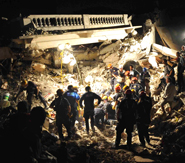AS/COA Online | After the Earthquake: Healing Haiti
/ L.A. County Fire Department and Rescue team in Port-au-Prince. (U.S. Navy photo by Petty Officer 2nd Class Justin Stumberg)In the week since a massive earthquake devastated Haiti, the world has been gripped by tragic news of chaos and death as well as hopeful rescue stories. Donors desperate to support relief efforts text and twitter information and ways to help. Even as a tense delay in food distribution continues while troops and aid workers arrive on the ground, questions arise over Haiti’s future—and who should help the country recover.
L.A. County Fire Department and Rescue team in Port-au-Prince. (U.S. Navy photo by Petty Officer 2nd Class Justin Stumberg)In the week since a massive earthquake devastated Haiti, the world has been gripped by tragic news of chaos and death as well as hopeful rescue stories. Donors desperate to support relief efforts text and twitter information and ways to help. Even as a tense delay in food distribution continues while troops and aid workers arrive on the ground, questions arise over Haiti’s future—and who should help the country recover.
“For those who have lost everything, help cannot come soon enough,” wrote UN Secretary-General Ban-Ki moon in an article penned after he visited Haiti over the weekend. On January 19, the UN Security Council backed his motion to send 3,500 additional UN peacekeepers to Haiti in the wake of the disaster, augmenting the 7,000-strong MINUSTAH forces already on the ground. Brazil has largest number of soldiers among the UN forces and will contribute to the increase by doubling its more than 1,250 troops there. Washington plans to bolster military forces by sending 10,000 U.S. troops within weeks.
At the same time, countries across the globe are pledging funds: the European Union offered $575 million in aid, Washington professed it will give more than the initial $100 million pledged, and Canada committed over $130 million for relief efforts. The Paris Club forgave Haiti’s $214 billion debt and called on other creditors to do the same. On Monday, Dominican President Leonel Fernández called for a $10 billion, five-year international fund for Haiti’s recovery.
Even as pandemonium reigns in the disaster’s wake, questions grow over how to best use the pledged money and manpower for Haiti’s recovery, as well as how to avoid mismanaged development and a refugee crisis. “A long-term project will require long-term attention, and political will that goes beyond the provision of emergency relief efforts,” writes COA’s Eric Farnsworth in the National Journal’s expert blog. Next week, a conference on the crisis could involve initial steps toward an ongoing strategy. On January 25, Montreal plays host to delegates from 11 countries. Attendees—who include Haiti’s Prime Minister Jean-Max Bellerive, U.S. Secretary of State Hillary Clinton, and French Foreign Affairs Minister Bernard Kouchner—will meet amidst calls for a Haitian version of the “Marshall Plan.”
Already, fissures have developed; a French minister accused Washington of “occupying” Haiti after U.S. air traffic controllers turned back a government plane sent by France. The squabble may reflect the double-edged sword that the disaster presents for U.S. policy, particularly given concerns raised about past U.S. policy toward the impoverished country. Before heading to Haiti Saturday, Secretary Clinton asserted that Washington views UN’s MINUSTAH forces are mainly responsible for security. “We are working to back them up but not to supplant them,” she said.
Despite the current misery on the ground, many see the possibility of a new beginning for the Caribbean country. “The road to recovery will be long, ridden with hunger and violence—these are inevitable,” writes Richard André for the Americas Quarterly blog. “Perhaps embedded in the horror of this earthquake is a genuine opportunity to rebuild Haiti, truly from the ground up, and emerge from this crisis with a chance to start fresh.”
Learn more:
- Explore ways to support relief efforts in Haiti.
- "A Haitian-American Perspective: Resilience in the Face of Tragedy," Richard André, Americas Quarterly blog, January 14, 2009.
- "Reconstruction Will Be the Real Challenge," Eric Farnsworth, National Journal, January 19, 2009.
- U.S. State Department information page about the January 12 earthquake.
- U.S. Department of Defense earthquake relief page.
- Pan American Health Organization Haiti page.
- Paris Club release announcing cancellation of Haiti’s debt.
